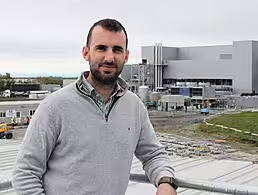Photonics is a rapidly growing career and one that has a lot of grounding in the world of health sciences.
Within the fast-moving world of emerging technologies in sci-tech, photonics has become one of the hottest career areas. In simplified terms, it is the science of generating, controlling and detecting light. There are a huge number of applications for the technology.
Dr David Williams, Dr Stephen Hegarty and Dr Michael McAuliffe are researchers in the Centre for Advanced Photonics and Process Analysis (CAPPA) in Cork Institute of Technology (CIT). They said: “Someone manufacturing a television is working in photonics. Someone installing photovoltaic panels is also working in photonics and someone designing an optical fibre network to carry internet traffic from Tokyo to London is working in photonics.”
A career in this area is also becoming more and more important to the healthcare industry, whereby light is used to diagnose and treat a wide range of acute and chronic conditions.
With an increasing demand for non-invasive, cost-effective treatments as well as personalised care, photonics-based healthcare methods are becoming hugely valuable.
So, if someone wants to work in photonics, what do they need to know? The CAPPA researchers said someone with a technical mind who isn’t afraid of a challenge would best suit this type of career.
“Given the broad scope of photonics, the subject can suit both those who have a strong interest in fundamental science problems and emerging ‘blue-sky’ concepts such as quantum computing, but also those who prefer more applied, industry-oriented work such as laser vision systems for self-driving cars or medical imaging,” they said.
When it comes to getting qualified, they said you would normally need a degree in physical sciences – for example, engineering or physics. After that, you may want to pursue a master’s or PhD in order to specialise. For healthcare photonics, this means seeking a health-focused postgraduate qualification, such as medical technology, biomedical engineering or medical imaging.
Williams, Hegarty and McAuliffe said you can find jobs as a photonics engineer in a number of areas and there are often opportunities to conduct research in these fields. “Many of these careers are transferable to other high-technology industries such as medical devices, pharmaceuticals and information technology.”
They added that because photonics is an underpinning technology, you could find yourself working on a spectrum of projects as the underlying principles are essentially the same.
“One project might involve working with clinicians and biologists on a medical device application, and the next could be with dairy farmers and chemists on milk analysis,” they said. “The work is rarely boring!”
The future of photonics
According to the CAPPA researchers, global photonics production volume is predicted to hit €615bn in 2020. “Currently, photonics employs 300,000 people in Europe, with a goal of 1m by 2030. As a result of this, there will be even more jobs generated in the coming years.”
In the past, this technology had been largely hidden, which has inhibited the growth of the industry. Now, as it grows, the need for talent is increasing.
“Technologically, we’re hoping for two things in the coming years,” they said. “For photonics to become a central technology in medical practice, both surgical and diagnostic; and for photonics to become so intuitive that we see non-specialists in SMEs, including photonics modules in their products and production facilities.”
From a health sciences point of view, the applications of photonics are plentiful, especially in the manufacturing of medical devices. Phototherapy can be used for skin conditions, imaging techniques using the technology can be applied in diagnostics and it also has a number of applications in ophthalmology.
Investment in the healthcare photonics industry is growing. In the UK, for example, the Centre for Process Innovation (CPI) is due to open the new National Centre for Healthcare Photonics.
With the health sciences and medtech industries growing at exponential rates and photonics becoming an essential technology to innovate in these sectors, it seems that the career prospects for those who want to work in healthcare photonics will be abundant.
Updated, 4.35pm, 25 September 2018: This article was updated to show that the input from CAPPA came from Dr David Williams, Dr Stephen Hegarty and Dr Michael McAuliffe, and not just Williams.




